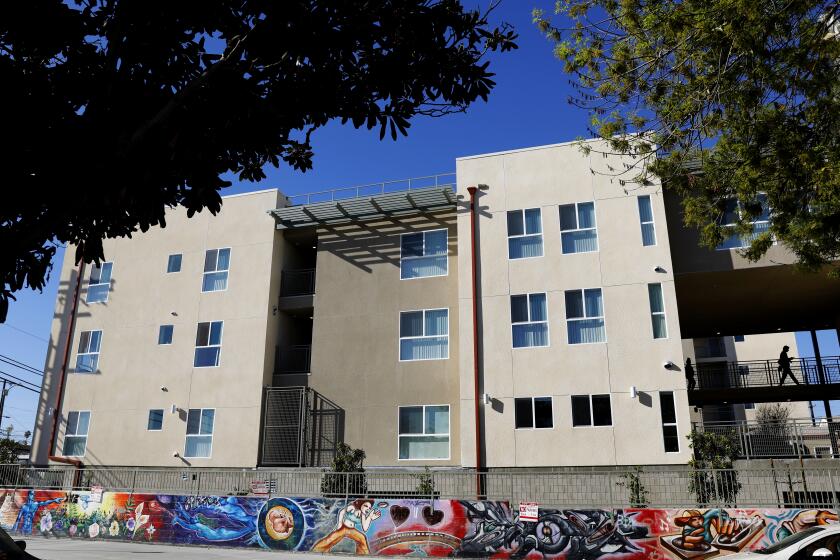Editorial: Mayor Bass is moving fast to house encampments. She’s going to need help — and hotel rooms

- Share via
On her first day in office, Dec. 12, Los Angeles Mayor Karen Bass declared a state of emergency on homelessness. Several days after that, she signed an order to make it faster for homeless housing to be approved.
Then on Tuesday, she launched the Inside Safe Initiative to temporarily move people in encampments into motels and hotels and then into permanent housing. By Thursday, nearly two dozen people who had been living on Cahuenga Boulevard and nearby areas in Hollywood had been given motel vouchers and were moving.
As she told her department managers when she started acting on the emergency orders she promised during her campaign, “We weren’t playing. This isn’t a stunt.”
So far, Bass’ plans have been ambitious and gotten off to a quick start. She has been optimistic but realistic. She has promised she will prioritize creating a pathway from temporary housing into permanent housing, but she hasn’t promised permanent housing overnight. “Even if we build at rocket speed, it will take months,” she told The Times editorial board Wednesday, the day she formally signed the Inside Safe Initiative.
Los Angeles Mayor Karen Bass’ plan to call a state of emergency on homelessness could make a difference.
Bass will have the most impact on homeless people (and neighborhoods) if she can get individuals into temporary housing that consists, at least, of a room, with a bathroom and a door with a lock, that they can call their own. The mayor’s office has asked City Council members and service providers to identify encampments where people had the most pressing needs in terms of mental health, substance use, physical ailments and other vulnerabilities.
The Cahuenga encampment, the first, had already been the site of a year-long effort by the People Concern, a service provider that had previously moved about 40 people into temporary housing with funding from the office of Councilmember Nithya Raman. (Most have gone on to permanent housing.) As of Wednesday, 21 more people from the encampment had moved into motels, according to the service provider. There were a few remaining individuals whom outreach workers would continue to work with.
Selecting encampments where engagement is already going on, having enough temporary housing placements for everyone and then making permanent housing options available are key, said John Maceri, the chief executive of the People Concern. “This is the way the system should have been working all along.”
If Bass and her staff can keep up this pace and ride herd on departments that are still sluggish when it comes to signing off on permanent housing projects, then the city could see a transformation on the streets.
But the hurdles ahead are high. There are about 42,000 homeless people in the city by the last count. (A new count is scheduled to take place early next year.) That means the city needs a lot of motel rooms. Bass said she wants to lease hotels, motels, and apartment buildings — in entirety or blocks of unit — and won’t brook price gouging by property owners. So she will need savvy real estate consultants to help broker those deals. And some encampments will be more challenging. It can take months of outreach before people trust the outreach workers asking them to move somewhere. And Bass is adamant that none of the encampment moves will be coerced and that no one will be cited or jailed. We strongly support that approach. But what will happen when a few people hold out and refuse a motel room?
Editorial: The only way out of homelessness is permanent housing. That’s why we need the HHH program
HHH housing is taking a long time to build, but the city’s housing bond program is not a failure.
Bass believes the emergency order gives her the right to pick sites for housing without the sign-off of the City Council. “But why would I?” Bass said. She wants to do this as a collaboration with council members. “I realize I’m on a honeymoon. I’ve got to make the best of it. … And working together works best.”
There will probably be disagreements with some council members over these issues, because they are under pressure from their constituents to make homeless encampments disappear. Bass knows that, but she insists that this is not about making homelessness disappear, it’s about providing homeless people with real housing.
We want to see Bass stand her ground on that, particularly when she starts hearing complaints from residents (or council members) about encampments that are still entrenched even as service providers diligently work to get people in them into housing. There’s no question that Bass’ citywide approach to housing people and focusing on encampments could speed up this process, but it will still take time.
More to Read
A cure for the common opinion
Get thought-provoking perspectives with our weekly newsletter.
You may occasionally receive promotional content from the Los Angeles Times.












